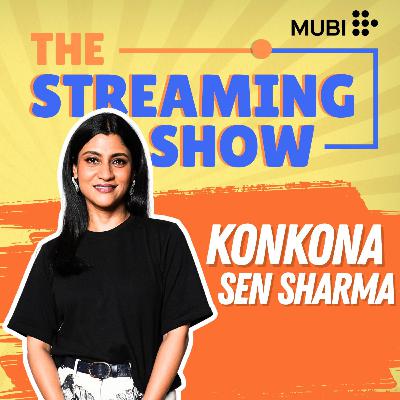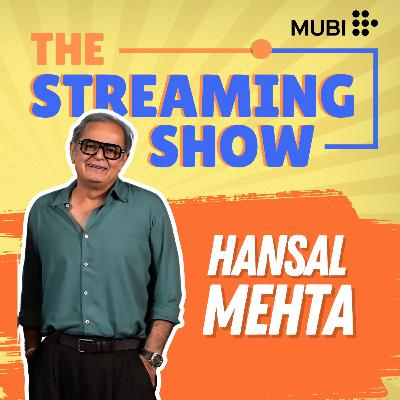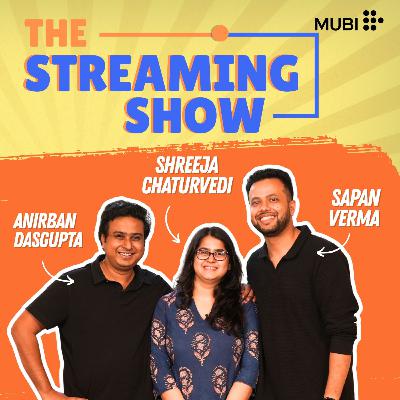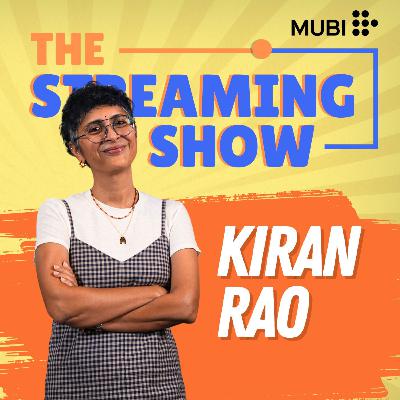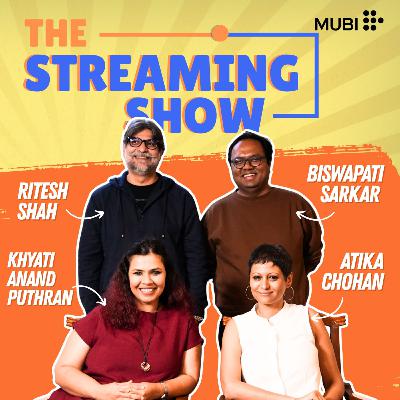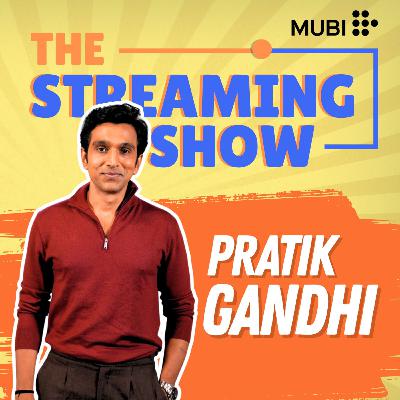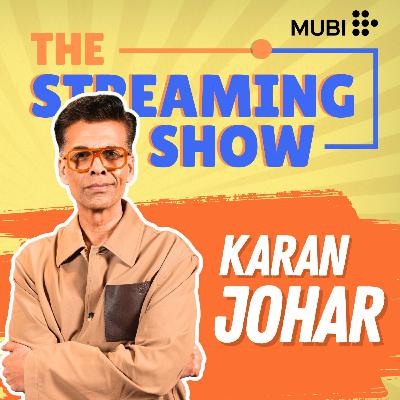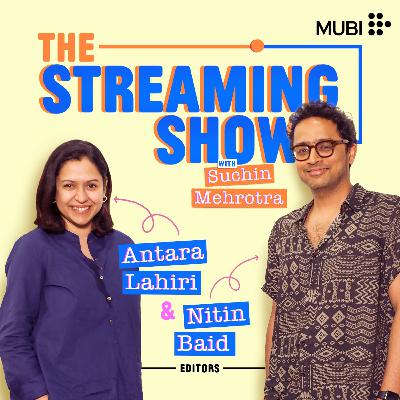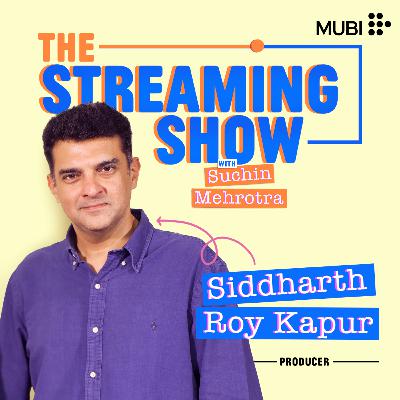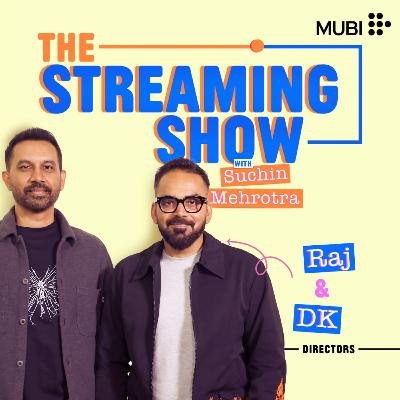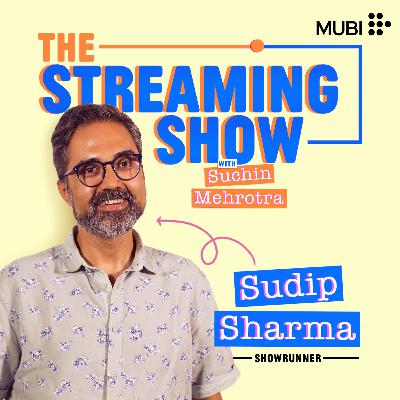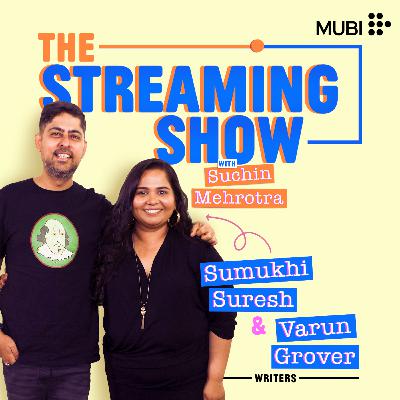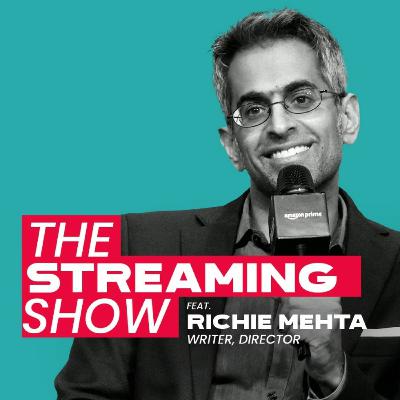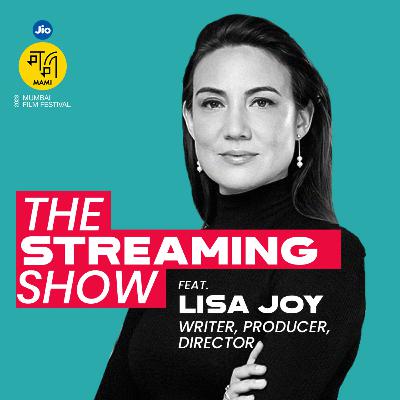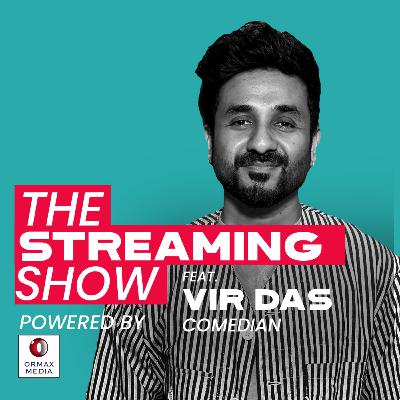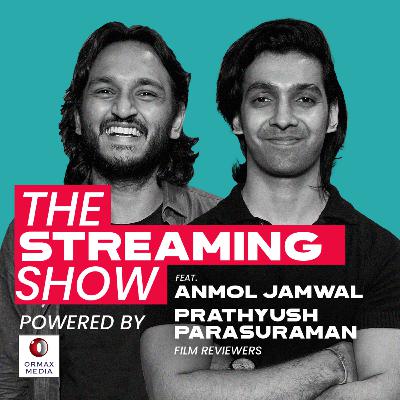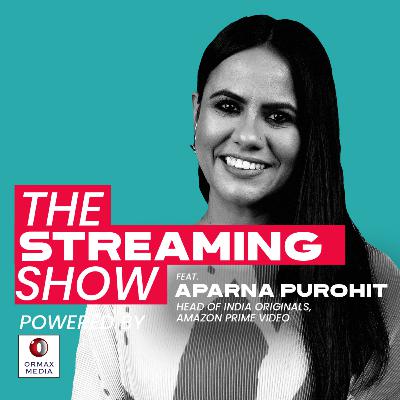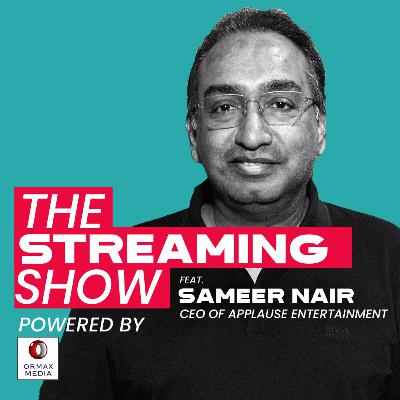Discover The Streaming Show
The Streaming Show

The Streaming Show
Author: Suchin Mehrotra
Subscribed: 4Played: 36Subscribe
Share
© Suchin Mehrotra
Description
Why are most Hindi streaming shows about crime and violence? What exactly are a showrunner and a writers' room? Are Mirzapur, The Family Man, Sacred Games and Scam 1992 the new blockbusters? How do streaming shows even make money?
Through a series of conversations with actors, artists, filmmakers, producers and platform heads, Suchin Mehrotra, one of the few film journalists and critics solely dedicated to covering the world of streaming, sets out to answer these questions to help navigate and provide a narrative to the beast of streaming.
Through a series of conversations with actors, artists, filmmakers, producers and platform heads, Suchin Mehrotra, one of the few film journalists and critics solely dedicated to covering the world of streaming, sets out to answer these questions to help navigate and provide a narrative to the beast of streaming.
28 Episodes
Reverse
On the season finale of #TheStreamingShow Season 3, Suchin speaks to one of the most exciting actors and filmmakers in town, Konkona Sen Sharma, about how she straddles both worlds, whether A Death In The Gunj would get made today, why the streaming space seems to be contracting and playing it safe, why shows seems to be getting cancelled left, right and centre, her new JioHotstar murder mystery Search: The Naina Murder Case and the upcoming Amazon Prime Video comedy series she's directing.
2025 marks 10 years of Roshan Mathew at the movies. Roshan is an actor who's been constantly at it, building a varied body of work and proving that talent, rather than packaging and positioning, may just be enough to make your presence felt. On episode 7 of #TheStreamingShow podcast, Suchin speaks to the talented actor about his exciting body of work, the challenges of being on the cusp of stardom, what makes Malayalam cinema so consistently exciting and clutter-breaking, the enduring superstardom of Mohanlal and Mammootty, why strategizing and reverse-engineering success never works, his "turning point" roles in films like Aanandam, Koode, Moothon, Kapella, Darlings, Ronth and the upcoming Chatha Pacha.
On the sixth episode of The Streaming Show Season 3, Suchin speaks to filmmaker Hansal Mehta about entering his production house era, his upcoming magnum opus Gandhi, the great streaming contraction, the state of Hindi cinema, antagonism between filmmakers and OTT platforms,, whether Scam 1992 could get made today, how data is corrupting storytelling, why our marketing and promotion system is broken, the scourge of paid reviews, his keen eye for casting, and more.
On episode five of The Streaming Show Podcast Season 3, Suchin sits down with some of the most exciting stand-up comedians - Anirban Dasgupta, Shreeja Chaturvedi and Sapan Verma - to discuss the state of the Indian comedy scene, comedy in the controversy and fear, whether every comedian needs to have a podcast, why streaming platforms broke up with stand-up, the allure of screenwriting, the responsibility of "being edgy", and why Varun Grover has an irritating amount of talent.
On the fourth episode of The Streaming Show Season 3, Suchin speaks to filmmaker Kiran Rao about the plight of the mid-budget film, the state of Indian independent cinema, why the distribution model for mainstream cinema is broken, the urgent need to change our approach to film marketing and promotions, what we can learn from Malayalam cinema and the vibrant industries in the South, how to get audiences back into theatres, the black hole of OTT and more.
On episode three of The Streaming Show Podcast Season 3, Suchin sits down with some of the most exciting screenwriters from Hindi cinema - Khyati Anand Puthran (Raat Jawaan Hai), Ritesh Shah (Pink, Airlift, Sardar Udham, Dahaad), Atika Chohan (Ulajh, Guilty, Chhapaak) and Biswapati Sarkar (Kaala Paani, Pitchers, Permanent Roommates) - to talk about the state of the Hindi film industry in 2025, why mainstream cinema is out of touch with audiences, what writers should and shouldn't be pitching in 2025, Bollywood's struggles with mounting the big masala movie, the industry's efforts to discourage "star writers", the ongoing uphill battle of credits and payment and much more.
There aren't many brains, and talents, in the business quite like Pratik Gandhi. He's as comfortable having a thoughtful conversation about data, market forces and budgets as he is about the craft and artistry of acting and storytelling. On the second episode of The Streaming Show Season 3, the actor spoke to Suchin about his inspiring journey to making it at the movies, why Scam 1992 may not get made today, why storytelling has been side-lined in the age of fear, formula and algorithm, the box office trap, building stardom in 2025 and more.
On the first episode of The Streaming Show Podcast Season 3, Suchin sits down with Karan Johar to discuss the rapidly shifting state of the Hindi film industry, the box office triumph of Saiyaara, the contraction of the streaming landscape, his shelved action film, the plight of the mid-budget film, how to fix Koffee With Karan, the future of Bollywood and Indian cinema, and why Hindi cinema has a director crisis.
What’s it like being an established actor in 2024? What’s it like navigating and bouncing between shows and films, platforms and mediums, theatrical and streaming?
To shed light on just that, for the season finale of The Streaming Show podcast, I spoke to Jim Sarbh. It feels like the talented actor has been everywhere over the last few years. On streaming, we’ve seen him on popular shows like Four More Shots Please, the beloved Made In Heaven, and one of my favourites Rocket Boys for which he even bagged an international Emmy nomination.
He also recently started his own YouTube series Crew Cut, which I strongly recommend, in which popular actors interview the storytellers and artists behind the scene about the craft of filmmaking.
Jim spoke to me about the ongoing …often soul crushing conflict between an actor and artist wanting to do good work as against the constant calculations of playing the positioning and perception game. Along with the current slump and uncertainty within the film industry, flitting between Shakespeare and playing the villain in his first Telugu film, his thoughts on the talent management ecosystem and a whole lot more.
Is 2024 an exciting time to be a film editor? Going by the sheer volume of theatrical streaming releases, you'd think so.
To break it down, I spoke to two of the busiest editors in town. In 2023 alone, prolific editor Nitin Baid had Sam Bahadur, Rocky Rani Ki Prem Kahaani, The Archies and Kho Gaye Hum Kahaan. Not to mention shows like Dahaad and Made In Heaven Season 2.
Antara Lahiri is known for projects like Tooth Pari, Delhi Crime Season 2, Shakuntala Devi, Four More Shots Please and one of my favourites. Modern Love Mumbai.
Aside from being an accomplished editor, Antara also runs an excellent YouTube channel called The Finest Cut With Antara Lahiri where she hosts insightful conversations with some of the finest editors in the business. It's highly recommended viewing.
Together, the two spoke to me whether editors get their due, the most insane feedback they've got from platforms, the issues with how editors are paid and how much of their time goes into salvaging shoddy storytelling
You cant really tell the Indian streaming story without talking to Sid Roy Kapur. One of the most respected producers in the business, he’s backed more than 80 films according to his IMDB, including gems like Dangal, Barfi, Udaan, Paan Singh Tomar, and Haider.
Previously the Managing Director of The Walt Disney Company India and CEO of UTV Motion Pictures, Sid also served as president of the Producers’ Guild of India for multiple terms. He now runs Roy Kapur Films which has made numerous shows and movies for streaming including Aranyak for Netflix and the excellent Rocket Boys for SonyLIV.
Sid spoke to me about the state of the streaming and theatrical landscapes, the continued struggles of smaller films and whether the golden age of streaming is well and truly over.
If you’re a writer or filmmaker who’s always thought in terms of feature films and wants to embark on your first series - where do you start? How do you start thinking in terms of episodes, cold opens, cliff-hangers and seasons?
To break down the art of approaching the beast of a series I spoke to who else but the maximum guys of streaming - Raj and DK. The dynamic duo have churned out one blockbuster show after another. Two seasons of one of our finest shows, The Family Man, Farzi (which is reportedly one of Prime Video’s most watched shows ever). Not to mention Guns and Gulaabs for Netflix.
And that’s not all. Due for release this year is Amazon’s Citadel Honey Bunny starring and also soon to be released is Another series they produced called Gulkanda Tales. I keep joking that Amazon should essentially build a shrine to them at this point. Raj and DK spoke to me about the art of structuring a series, the challenges of tackling a second season, what goes into nailing a great climax and the biggest turn offs they see in other Indian Shows.
It’s a pretty bleak time for the Indian streaming landscape, to put it lightly. I’ve spoken to writers who’ve said they’ve never seen the industry in such bad shape. You hear constant horror stories these days. Everything from platforms no longer commissioning shows, to shows in development or even about to start production which are either shelved or facing drastically reduced budgets. And these are big, well-known filmmakers and writers. So how bad is it and is there any hope in sight?
To break it down, I spoke to one of the most significant storytelling voices we have. Sudip Sharma is the creator of Paatal Lok and Kohrra. He’s one of the few true blue showrunners we have - a writer who’s stepped up and become captain of the ship of his shows. Sudip spoke to me about the crippling uncertainty of the current streaming landscape for writers, the calibre of stories on streaming, his experiences of working with Netflix vs Amazon Prime Video, his advice for young writers trying to weather the current storm, and what the future of long-form storytelling looks like in India.
What exactly does an effective writers' room look like, and have we adopted the concept well within the Indian streaming ecosystem? Or is it still a free-for-all with everyone just doing their own thing? To break it down I spoke to two of the most exciting screenwriters in town, both of whom bring new meaning to the term multihyphenate talent.
Varun Grover was head writer in one of the first writers rooms for a major streamer with Sacred Games. Aside from creating and starring in Prime Video’s Pushpavalli, one of the finest shows we’ve made, Sumukhi Suresh recently founded MotorMouth - a company solely dedicated to writing and developing shows and movies. At MotorMouth, Sumukhi is currently juggling 8 separate writers rooms at once.
In a hilarious, insightful chat, the two sparking screenwriters spoke to me about the do’s and don'ts of running a writers' room, bringing together the right group of personalities, why writers fighting can actually be a good thing, what the job of a head writer is, how young writers can deal with asshole bosses and toxic power structures, the insanity of writers being banned on sets and the surprising significance of Bengali food.
Writer-director Richie Mehta doesn't quite follow the rules. The way Richie operates and creates stand-out streaming shows is far from conventional. Rather than pitching to a streamer and having a series commissioned, he finds independent producers to fund the entire series and only Then finds a home for it. That's how the clutter-breaking benchmark-setting Emmy-winning first season of Delhi Crime ended up on Netflix, and it's the same story with Richie's new series Poacher which is releasing on Amazon Prime Video. Poacher is also the first series produced by Hollywood-based production company QC Entertainment, which is behind films like Jordan Peele’s “Get Out” and Spike Lee’s “BlacKkKlansman.”
At the recent press junket of Poacher, Richie spoke to me about his unconventional way of getting shows made, why he prefers to engage with platforms only when the shows are shot and ready, the bleak state of the streaming ecosystem at present, and his thoughts on Delhi Crime being turned into a franchise when it was only ever meant to be a one-season story.
Filmmaker, writer, producer and showrunner Lisa Joy knows a thing or two about making great TV.
The co-creator of Westworld, Lisa started her career as a writer on Pushing Daisies and has worked on several shows since. She’s also a producer on multiple shows such as last year’s The Peripheral on Amazon along with the highly anticipated upcoming Fallout series, an adaption of one of the most popular games out there.
At the recently conducted Jio MAMI Mumbai film festival, I moderated a session with Lisa on the art of longform storytelling. In front of a live audience, we spoke about the Hollywood model for creating series and what we can learn from it here, what the heck a showrunner is considering we still seem to have different definitions of it, how to navigate a writers room as a young writer and a whole lot more.
This season of The Streaming Show podcast was only ever supposed to be ten episodes. But in a happy turn of events, this 11th episode materialized in which I spoke to one of my favorite artists Vir Das - about a topic I feel very strongly about - the lack of comedies on streaming and why there seems to be a fear of funny among platforms. Shows like Amazon's glorious Pushpavalli and Humble Politician Nograj on Voot remain the rare exceptions.
Vir spoke to me about the severe lack of laughs, the multiple shows he’s currently show running,
the need for more platform executives who understand comedy, what went wrong with his Netflix series Hasmukh and what streaming has done for stand-up and vice versa.
Through this entire season of The Streaming Show podcast, we've had some really insightful conversations with filmmakers, writers, and platform executives about how streaming has changed the game. But what about the shows themselves? The game changers, clutter breakers, and gold standards of storytelling on streaming. So Suchin sat down with his fellow Film Companion critic Prathyush Parasuraman and YouTuber and reviewer Anmol Jamwal who runs the popular YouTube channel Tried and Refused productions to discuss our picks of the best of the best. From underrated gems to obvious juggernauts the three of us discussed the finest shows Indian steamers have made so far and why they demand your attention
When it comes to Indian Streaming, in terms of consistently great storytelling, there's little doubt that Amazon Prime Video rules the roost. Put simply,the streamer is home to most of our best shows.
From gloriously entertaining smash hits like Mirzapur to prestige shows like
Pushpavalli, Paatal Lok, Panchayat, The Family Man, Guilty Minds, Jubilee, Made In Heaven, Laakhon Mein Ek Season 2, Suzhal and I could literally go on.
But what is it specifically about how Amazon operates that allows it to be home to many of the best? What are they doing or not doing as compared to enable their impressive track record?
To break it down, Suchin spoke to Head of India Originals, Aparna Purohit.
We spoke about the Amazon secret sauce, why she's tired of being pitched different versions of Mirzapur, the challenges of nailing a second season, the need for more rockstar streaming executives, and the changes she'd like to see within the streaming landscape
Applause Entertainment is as big as any Indian studio making movies and shows for streaming, gets. In just over five years they've made 44 shows for almost every platform around. They're behind shows and remakes like Criminal Justice, The Indian Office, Rudra, City Of Dreams, and Tanaav. Not to mention one of my favorite comedies Humble Politician Nograj and their one prestige show Scam 1992.
The reason Suchin wanted to speak to Applause Entertainment CEO Sameer Nair was to discuss their unique business model. Applause doesn't just pitch the ideas of shows to platforms, they go off and shoot the entire season and pitch the ready series and license it to streamers for x number of years. The platform gets a ready show, but Applause owns the IP.
At a time when streamers in the US are dropping beloved shows from their platforms to save costs, the Applause model feels more intriguing. Especially for filmmakers who want to hold onto the IP of their ideas.
Sameer spoke to Suchin about the onslaught of remakes and Call my agent Bollywood, in particular, which he passionately defended. We also spoke about the pros and cons of licensing and why he isn't put off by the formula


